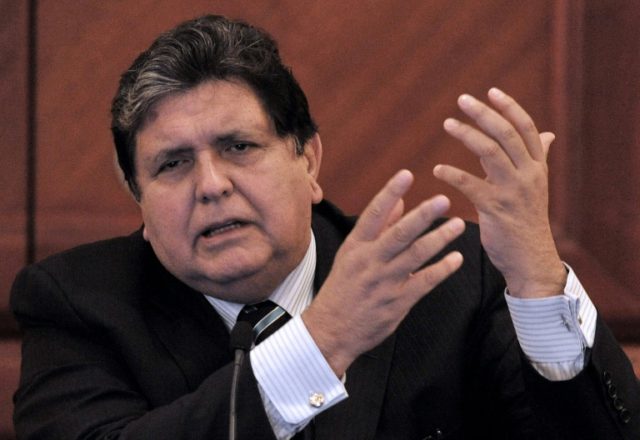Two-time Peruvian President Alan García ended his life with a gunshot wound to the head Wednesday after excusing himself from the presence of investigators seeking to detain him on corruption charges and retreating to his bedroom.
García governed as a leftist firebrand from 1986-1990 and again as a centrist alternative to leftist Ollanta Humala from 2006-2011. Like Humala, who went on to govern as president from 2011-2016, García stood accused of enriching himself illegally through ties with the Brazilian firm Odebrecht.
In his last interview, García said he was “a Christian” and believed in “life after death,” and predicted it would be his last interview “in freedom.”
Peru’s La República newspaper reported Tuesday that García was in his home when a Special Investigative Team for “Operation Car Wash” – a sprawling corruption probe with its origins in Brazil – knocked on his door to take him into preventative detention. Peruvian police have arrested several presidents in this manner to prevent them from fleeing abroad, as García second predecessor Alejandro Toledo has done.
Sources with knowledge of what occurred told the newspaper that the sound of García’s Colt 38 firing took the law enforcement team by surprise.
“As soon as he found out that we were there to detain him, he asked for permission to speak to his attorney and went into his room, closed the door, and, a few minutes later, the gun fired,” an unnamed source told La República. Another source said García was “calm and serene when he spoke to [authorities]. He made no indication of resistance.”
The investigators found García alive but could not save him, as he had shot himself in the head.
Odebrecht is a Brazilian contracting firm considered one of the primary actors in “Operation Car Wash,” the code name for the investigation into a corruption scheme in which Brazilian politicians would grant Odebrecht infrastructure project contracts at exorbitant prices, paid for by the taxpayer, and Odebrecht would kick back part of the extra cash. In Brazil, dozens of politicians have been arrested in the affair, including two recent presidents: socialist Luiz Inácio Lula da Silva and centrist Michel Temer.
Odebrecht attempted to reconstruct the scheme throughout Latin America. In Peru, few senior federal leaders have remained untouched by the scandal. The aforementioned Humala was recently released from prison, along with wife Nadine Heredia, after serving time for allegedly taking bribes from Odebrecht. Keiko Fujimori, who ran against Humala for president, was arrested last year for also allegedly taking campaign funding from the firm. Former President Pedro Pablo Kuczynski, who resigned after unrelated accusations surfaced of buying votes, took over $3 million in “consulting” fees from Odebrecht. Toledo escaped arrest for allegedly taking bribes as revealed in the Humala case by fleeing to the United States.
The only recent Peruvian presidents untouched by the Odebrecht scandal so far are current president Martín Vizcarra and former President Alberto Fujimori, father of Keiko and lawmaker Kenji Fujimori, who is serving a 25-year prison sentence for alleged “crimes against humanity” during a campaign to subdue Marxist terrorist groups in the 1990s.
García stood accused of “creating a criminal organization” to embezzle tax dollars through Odebrecht during his second tenure from 2006 to 2011. García had already acknowledged that corruption existed during his first tenure. In an interview with Peruvian journalist Jaime Bayly, he admitted, “all government steal. You pick people, but only God knows what is in the soul of a person. You believe in a person and they betray you.”
During that tenure, García ran an administration adverse to much of the West and recalcitrant against global financial institutions that urged Peru to engage in austerity measures to fix its economy. García nationalized major Peruvian banks and insurance firms in an attempt to salvage the devastating effects of his policies, but, as the Guardian notes, “by … 1989, inflation was running at an estimated 7,000%, the banks were in crisis, middle-class Peruvians had seen their savings decimated and he was one of the most unpopular leaders in modern Peruvian history.”
He ran for president two more times, winning the second and beginning a new tenure in 2006. In that election, García’s campaign fed from the strident leftism of his rival Humala, who many Peruvian voters feared was a socialist in the mold of Venezuela’s Hugo Chávez. García, little mentioning his first presidency, ran to the right of Humala and won.
In his final interview this week, he denied any wrongdoing.
“I trust in history. I am Christian [and] I believe in life after death. I believe in history. And, if it allows me, I believe I have a small piece of the history of Peru,” he said.

COMMENTS
Please let us know if you're having issues with commenting.